R.W.W. Greene's Blog, page 4
January 2, 2024
Can I Kick the Habit of A Lifetime?
In 2023, for the first time ever, I kept track of the books I read during the year
For convenience’s sake, I used Goodreads, and by Dec. 31, 2023, I’d copped to reading ninety-nine books over the past twelve months. I didn’t count manuscripts people asked me to read and, because I got bored, I forgot to add several titles from the last quarter of the year.
On Dec. 14, Goodreads sent me an email congratulating me for being in the “top 25% of readers” who bother to share their information with the site (and with Amazon, which owns it). Of course, I had it framed. Just kidding.

2023 was a typical year for me, reading-wise. I read for pleasure, mostly, sometimes for specific knowledge or research. I’m not overly picky about what I read. If I see it, and it looks interesting, I’ll probably pick it up. I very rarely DNF.
It’s a habit I formed early in my life.
Now, I’m trying to break it. In 2024, I will read only twenty-four books.
My spouse doesn’t think I can do it, and frankly I’m not sure, either. Reading is what I do. It’s likely the only thing I could medal in. But I’m going to try. Twenty-four books, two books a month.
A caveat: I will not count books I might be asked to blurb or manuscripts I’m asked to read. I also will not count DNFs, and I will not try to cheese my way into reading more by not finishing author’s notes, etc. Audio books, if any, will count.
I have not decided if this will be an exercise in ‘close’ or ‘deep’ reading. I might annotate or write about what I read, or I might not. Mostly, I’m curious what breaking the habit will do to my brain. (For a hot second, I was tempted to try not reading any books at all, but that was madness!)
Will reading less make me appreciate what I read more? Will I stumble into new realms of understanding and loving prose? Might I simply lose my mind? All things are possible.
I do vow here, not to replace reading with more gaming or television. I may write more. Maybe I’ll get serious (again) about learning to play guitar. I could start a sketchbook or keep a fitness journal. Perhaps I’ll try stop-motion animation again. Maybe I’ll take a class.
It will be interesting, or it will be supremely boring. Time will tell.
What do you think will happen? Has anyone tried something like this? Do you have any tips or warnings?
NEWS: I’m THIS close to finishing my new book, a thrillerish sci-fi thing, and I’ll be sending it off to my agent in a week or so. I’ve signed up for CapriCon in early February and after that I’m Boskone-bound.
If you want to help a brother out, and you like my books, you could drop a review in one of the usual places. It makes the various algorithms happy and keeps my stuff in the mix. If you’ve not read a book by R.W.W. Greene, here’s a good place to find one. (Your local independent bookstore is even better!)
Happy New Year, friends. Until there is peace,
Rob
Thanks for reading twenty-first-century blues! Subscribe for free to receive new posts and support my work.
November 28, 2023
"Nomad Century"
“Are you seriously talking about a different book at your book launch?”
Yeah, seriously. It’s likely not something my agent and publicist would recommend, but I had to bring up my new favorite the other day in front of my captive audience. I even purchased two additional copies of the thing at the bookstore (Gibson’s in Concord, NH) that hosted my launch.
The book’s title is Nomad Century: How Climate Migration Will Reshape Our World. The author is Gaia Vince. The hardcover came out in 2022, but the paperback emerged a year later, just in time for me to find it at Ballast Books in Bremerton, Wash. when I was on that side of the country for a wedding. It’s nonfiction.

The predictions this well-researched book makes are dire. Billions-with-a-B climate-change refugees by 2050. Billions more by century’s end. Rising temperatures that maybe-could-be-probably-won’t be caught in time. Shortages. Starvation. Heatstroke. Death.
It gave me hope. We have always survived by moving to safer harbors, the book says. This time will be no different. And if we’re smart about it, we might do more than survive. We might thrive. If we’re really clever, it might only be a temporary retreat until the world heals.
New cities in the north. Global citizenship. A UN migration plan with teeth. A recognition that bodies, minds, and labor are our most important resource. A plan grander than any plan we’ve ever made. A plan for the entire planet. Vince makes it all sound possible, and I sorely need that.
I have three copies of Nomad Century now -- one for me, two to pass on. One will go to a pal, a leader type who might be interested. The other I think I’ll send to the next governor of our state (or at least to the woman I hope will get the job). All my elected reps should get one. All yours, too.
One for Biden.
I’m going to go out on a limb here and suggest that everyone read this book.
And then act on it.
NEWS: I had a novel come out recently. It’s called Earth Retrograde, and people seem to be liking it.
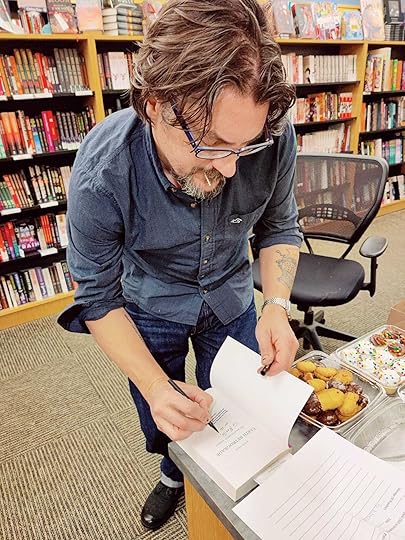 I sign a copy of my own book at Gibson’s Bookstore in Concord, NH the other day.
I sign a copy of my own book at Gibson’s Bookstore in Concord, NH the other day. Thanks for reading twenty-first-century blues! Subscribe for free to receive new posts and support my work.
November 14, 2023
Sans Ants
— A very short story, originally published, New Myths.com, June 2014
“Is that wind too much on you? I can adjust it.”
I pulled the grass stem out of my mouth and flicked it toward the stream. The breeze dropped it about a meter short of the water. I smiled at her. “It’s perfect.”
Genni blushed. “I’m glad you like it. It’s not a full custom, but I spent a long time modifying it. What do you want to do today?”
I stretched out on the picnic blanket. “I just want to enjoy it, and you, and much as possible.”
The resolution was fantastic, and somehow, she’d programmed my avatar to produce goosebumps when the wind tickled my neck. They didn’t feel exactly right, but it was close. It was incredible considering Genni had never had a goosebump.
 Photo by Clay Banks on Unsplash
Photo by Clay Banks on UnsplashI plucked another grass stem and put it between my teeth. The plant tasted real, too, not that I’d had any more experience with grass than Genni had with skin. “It’s amazing.” I rolled over to see her face. She was blond today, with a pointed chin and green eyes. “You’re amazing.”
I leaned closer and kissed her on her forehead and lips. The kiss felt perfect to me. A lot of clock hours had gone into the creation of the subroutine, along with hundreds of years of adjustments.
“Do you have to go?” she said.
“You know I do. It’s what we came here for.”
“You act like you don’t even care.”
Genni’s family had traveled just as far as mine had, but she’d never leave the ship. She couldn’t. She was an Artifact. Her whole existence depended on the ship’s mainframe. She might live forever, but she’d never touch the surface of the planet below. “You can’t go. I can’t stay,” I said. “We knew that when we started this.”
She swallowed and nodded tightly. “I just didn’t think it would come so soon.”
I swatted her on the butt. “Enough. We have weeks, yet.”
Weeks on the mainframe, but only a day for my real body back in my capsule. In twenty-five hours I’d be on the shuttle, headed for the surface to start a new human colony.
The sky darkened. “It’s not enough time, and you know it,” Genni said. “You log out for a work shift, and it feels like you’re gone for a month! What am I supposed to do?”
“It’s out of my control,” I said. “We haven’t been traveling for eighty years so that I can stay on the ship! We have a mission.”
Thunder boomed, and the gentle breeze turned hard and cold. “The mission!” Genni said. “Don’t I mean anything to you?”
Hailstones stung my skin. “Genni, baby, you mean everything to me, but …”
The stream froze solid with a sharp crack. “You’re a liar!” Genni said. “After all I’ve done …” The grass under me withered and died. “Everything you made me do …”
“Genni. Genni, please calm down.” The ground burst open in a fountain of molten rock. “Screw it,” I said. “Pause execution. Repeat. Pause execution.”
The program froze.
“Drop the jealousy and possessiveness algorithms by forty percent and restore to …” I looked at my watch. “... three minutes ago.”
I blinked.
“Is that wind too much on you? I can adjust it.”
I pulled the grass stem out of my mouth and flicked it toward the stream. I smiled at her. “It’s perfect.”
Genni blushed. “I’m glad you like it. It’s not a full custom, but I spent a long time modifying it. What do you want to do today?”
I considered the possibilities. “Everything.”
the end
A little blast from the past today. I wrote it to try out some ideas for the sequel of a book I drafted but never finished. The idea was that, at the conclusion of a generation ship’s voyage, not everyone would want to get off the boat. Anyway…
THE NEWS: Earth Retrograde continues to do its thing, with reviews here and here. (Many thanks for those, by the way.) My next event, likely my only New Hampshire event, is set for 6:30pm Thursday, Nov. 16 at Gibson’s Bookstore in Concord. NH. I need to figure out refreshments, but there will be some.
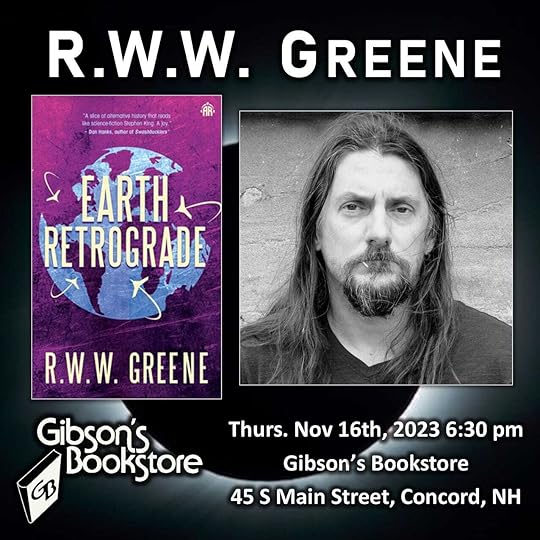
In other news, we’re skating close to the end of the college semester, which gives me hope that I can get a good draft of the New Thing to my agent by the end of December. It’s nice to have a New Thing. It’s even nicer to have a New Thing and Something Fun to work on after that!
Keep stomping. -rob
Thanks for reading twenty-first-century blues! Subscribe for free to receive new posts and support my work.
October 30, 2023
Calling All Boston-Area Sci-Fi Fans
Friends, last week’s launch of Earth Retrograde, the final chapter of The First Planets duology, went off without a hitch. Very early on launch day, one of my former students shared a picture she took at Dubray Books in Galway, Ireland. Other reports, from closer by and further afield followed suit.

Launching a book is a bit like bowling. Once the ball leaves your hand, no amount of wishing, hoping, or contorting can alter its path. It’s gonna go where it’s gonna go, no matter how hard you dance around and flap your arms.
But still we try, with events like the one upcoming. 6:30pm Thursday, Nov. 2, at Pandemonium Books & Games in Cambridge, Mass. Admission is $5 (or $18.99 if you want to buy the book there), and you shall be treated to a reading and chat by yours truly in one of the best bookstores in the Boston area.
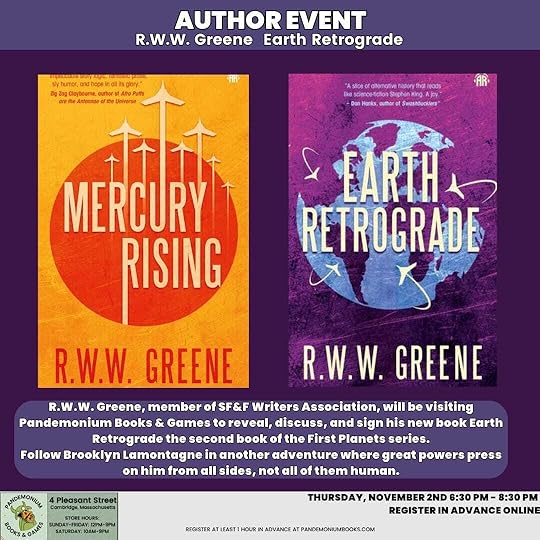
Advance registration is required here. I’d love to see all or some of y’all there. There are plenty of good restaurants in the area if you want to make a night of it.
Thanks for all. -Rob
October 17, 2023
Jet Carson & the Climate Machine
Happy Tuesday!
I finished the first draft of a new novel a few days ago, so while that’s cooling, I’m playing around with a few ideas. The one I’m sharing with you today came from Robert Junker, a gentleman I follow on various social media. He asked me if I had any Jet Carson (an important side character in “Mercury Rising”) short stories lying around.
Now, I’ve had a lot of thoughts about expansions of The First Planets universe, but not that one. I responded thusly:
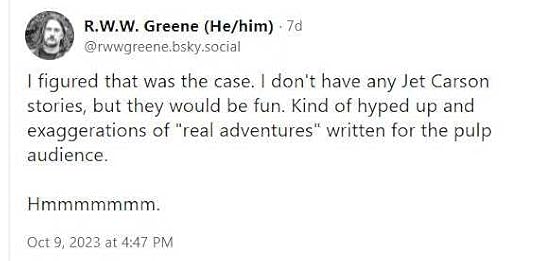
And couldn’t stop thinking about it. And, so, I started something, an excerpt of which is printed below.
Jet Carson & the Climate Machine, 1957 (excerpt):
Dr Bijay “Banjo” Banerjee took off his glasses. “We have a problem, Captain.”
Captain Jet Carson leaned against the door frame he’d come partway through. “Didn’t think you’d called me down to talk about the weather, Banjo.”
“That is where you are wrong, my friend.” Banjo gestured to a seat on the other side of his desk. “Tea?”
“I brought my own.” Jet put a stained coffee mug on the desktop and claimed a chair.
Banjo glanced at the darkness inside the cup and pulled a face. Jet liked his coffee strong enough to power a docking thruster and so dark it trapped light. “Count Czar is back.”
Jet grunted. “That didn’t take long.”
“The Count has plans within plans. It’s possible the Callisto matter was just a distraction.”
“Heck of a distraction. Took two fighter wings and the Admiral’s flagship to chase him out of there.”
“Even so.” Banjo tented his fingers on his desk. “The speed at which he returned suggests he had this plan in the works long before then.”
“What’s he doing now?”
“He’s built a machine that he claims can raise the average temperature on Earth by three degrees in a single year.”
Jet took a mouthful of coffee. “Doesn’t sound too bad.”
“You’ve not seen the projections. How does a worldwide fifty-foot sea-level rise sound?”
“Pretty bad.”
Banjo ticked off troubles on his fingers. “Climate change at a speed natural evolution cannot possibly keep up with. The desertification of half the continental United States. Millions upon millions of desperate refugees from all over the planet looking for asylum. Super storms and broken weather patterns. Deadly heat events and domes. Polar vortexes.” He lowered his hands to the desk. “I could go on.”
“I get the picture, doc.” Jet rubbed his chin. It was just past two, but he stubbled up quick. “What’s he want?”
“A sum of money equivalent to three-years’ worth of the gross national products of the US, Europe, China, and the Soviet Union.”
“I’m guessing that’s a lot.” Jet’s chair squeaked. “Where’s he been since Calisto?
“The Arctic, apparently.” Banjo lit his pipe. “We haven’t found the base, but it makes sense. His family fled there just before the Russian Revolution in ’17.”
“Little before my time.” Jet smirked. “From an ice moon to the Arctic. You figure he’s set up on another popsicle somewhere? Pluto?”
“Probably not. Too far out.
“Could be anywhere then. The Moon’s got fifteen million square miles of its own. Still plenty of caves and cracks we haven’t laid eyes on.”
“It’s Mars.” Banjo tossed a folder onto the desk. “We have a mission for you, Jet. You’re not going to like it, and you’re going to like who you’re working with even less.”
Jet picked up the folder, opened it to the first print out. “Well, heck.”
Jet paced angrily in their small living room. “We’re technically at war with these guys. How am I supposed to work with them?”
“You could resign in protest,” said Betty Carson, Jet’s wife of ten years. “Max Martinez would love to hire you as a pilot on one of his Moon liners.”
“Ha! Can you imagine me flying one of those whales back and forth all day?”
“Easily.” Her mouth firmed. “Then you’d be home on the weekends, and we could get a good deal on a lunar cruise.”
“Betts.” He sat next to her on the couch and took her hands. “Betts, you knew what you were getting into when we tied the knot.”
“Maybe I’ve gotten tired of seeing you put your life on the line.”
“You take on the most dangerous people in the city every day, Ms District Attorney!” He laughed. “I don’t see you batting an eye over that.”
“It’s not the same.” She huffed. “No one’s trying to blow me up in court.” A thin smile found her lips. “At least not usually.”
“I’m going to spend the next two weeks bored and missing you. Then there’ll be a day or two of light danger, followed by another two weeks of sitting around.” He lifted her hands to his lips. “Most of that time, I’ll be safer than you are down here. At least in space I don’t have to worry about bad drivers or getting hit by lightning.”
“No, you just have to worry about working with Yuri Grishuk, the Soviet Ace. How many fliers has he killed again?”
“Most of those were Nazis, dear. I shot down my share of them, too.”
“Still. What are they thinking sending you to Mars alone with him?”
“They’re thinking Count Czar is a bigger threat.” He kissed her mouth. “And I agree with them.”
 Made with HotPot.AI
Made with HotPot.AIThe next day Jet flew his long-range fighter, the Victory, to Paris, France, neutral ground for his first meeting with Yuri Grishuk. He landed at the American base outside the city and swapped his flight suit for something more appropriate for nightlife in the City of Lights.
“Can I get a ride in?”
The leader of the ground crew, a brawny fellow named Armaund Moreau, pointed with his cigarette. “You can sign out a Vespa at the gate, no trouble.”
The little scooter didn’t have the horsepower of Jet’s motorcycle back home, but it was perfect for the narrow streets of the old city. Jet had a little time to kill so he took the scenic route, checking out a few spots he remembered from the war and his honeymoon some years later. Need to get Betts back here. She’s right; we both deserve a break.
Jett parked the Vespa outside the wine bar he’d been directed to and ducked inside the smoky interior. The table was in the rear. Grishuk was seated there with another man, their backs against the wall, drinking wine and smoking slim cigarettes.
“Commander Grishuk.” He dipped his head, never taking his eyes off the man.
Grishuk and the other man rose. “Captain Carson. I’ve heard so much about you.” Grishuk extended his hand.
The Soviet Ace was smaller than Jet had expected, compact in a way that suggested precision and speed. He shook the proffered hand. “Nice place.”
“We come here whenever we can.” He gestured to the other man. “This is my husband Afanazy Affek.”
Jet shook Afanazy’s hand, too. “I didn’t realize Soviet law allowed it.”
“It’s allowed, but not encouraged.” Afanazy smiled. “We seldom go out in public together in Moscow, so our little trips to Paris are a treat.”
“Please, sit.” Yuri gestured at the chairs opposite. “Wine?”
“Sure.” Jett examined the bottle. “I like red.”
The End (for now)
Maybe this will come to something, maybe it won’t. I’ve three or four full drafts in the drawer now, along with a few partials. I like to strike where the iron is hottest, but some Jet Carson shorts or novelettes might be fun. What do you think?
NEWS: I’m counting down the days (six!) until Earth Retrograde (the sequel to Mercury Rising) springs forth. Early reviews are still looking good, and there are two book events scheduled thus far – 6:30pm Nov. 2 at Pandemonium Books & Games in Cambridge, MA and 6:30pm Nov. 16, at Gibson’s Bookstore in Concord, NH. I’ll also be doing a signing event at World Fantasy Con in Kansas City, MO, but I don’t have much information on that, yet.
Paul Semel interviewed me about The First Planets duology here (and I am grateful).
How about a book giveaway? Tell ya what, the first five people who comment on this post with the word “rutabaga” will get a free e-copy of Mercury Rising to love (and hopefully review).
Currently reading:
Lessons in Bird Watching by Honey Watson.
Listening to:
Beyond Mere Politeness: The Art of True Civility
“Take a Walk on the Wild Side” (Cover)
That’s it, friends. In spite of it all, try to walk in beauty. -Rob
Thanks for reading twenty-first-century blues! Subscribe for free to receive new posts and support my work.
October 3, 2023
twenty-one days until book
I woke up this morning and counted the days. Oof … only twenty and a wakeup until the release of Earth Retrograde, the second and final installment of The First Planets duology.
Early reviews are coming in, and I’m feeling pretty good about them:
“You will struggle to find a better literary Sci-Fi embodiment of the space girl lofi hiphop videos on YouTube than Mercury Rising and Earth Retrograde . There is no drawback to this duology. No downside. Greene nailed it.”
In the first book, Mercury Rising, we met Brooklyn Lamontagne, a petty criminal working to pay his (and his mom’s) rent in 1976 New York — but not the one you know. See, in Brooklyn’s world, Oppenheimer put his talents into something constructive and came up with an engine that put us on the moon in the early 1950s. Everything was going swell until the aliens showed up in 1961 and started wrecking things. Brooklyn — through no plan of his own, of course — ends up joining the Earth Orbital Forces and shipping out to fight the extraterrestrial menace.
Publishers Weekly called Mercury Rising a “genre-bending romp,” and who am I to argue?
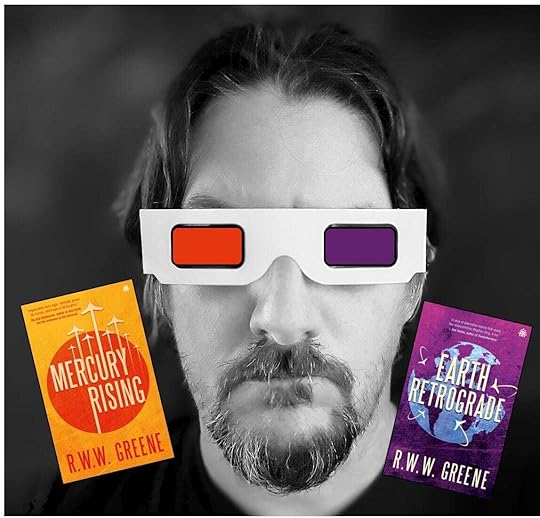 You can only see the whole picture if you have both.
You can only see the whole picture if you have both.The new book fast-forwards to 1999, and things are … different. I don’t want to say too much more than that. One Goodreads reviewer wrote, “The odds are against him but Greene’s belief in humanity (however alien the form it comes in) shines through and Brooklyn is a character that will stay with me for his efforts alone.” I won’t debate that, either.
If you missed out on Mercury Rising, it’s still available in the shops and, as I write this, on discount ($2.99) as an e-book via Amazon and Barnes & Noble. Earth Retrograde comes out Oct. 24 (two days before my birthday!), and it’s available for preorder everywhere you might shop for books. If you like physical copies, I’d prefer you bought it from your local independent bookstore or Bookshop.org. You can also get Mercury Rising as an audio book, and I hear the Earth Retrograde audio is in the works.
If you’re planning to attend World Fantasy Con in Kansas City, I’ll be there to sign books, talk speculative fiction, and otherwise be charming and interesting. Folks in the Cambridge/Boston area can find me at a ticketed event Nov. 2, courtesy of the fine folks at Pandemonium Books & Games, where I will read from the new book and, again, do my best to be charming and interesting. Later in the month, I’ll be at Gibson’s Bookstore in Concord, NH for a similar thing, but that date is not yet set in stone nor electrons. I’ll announce any additional events and sightings through the usual methods.
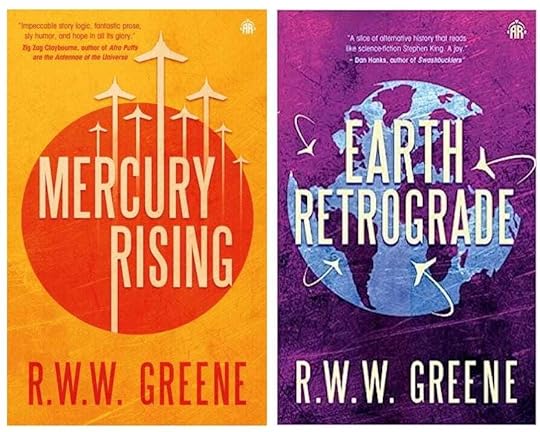
Whew! I’m grateful to Angry Robot Books for letting me get the entire story out, grateful to the folks who took time to review and otherwise promote the thing, and beholden to the many fine people who reached for their wallets and bought the books. Publishing is a strange business, but it all comes down to the story. I hope you like this one. -Rob
Thanks for reading twenty-first-century blues! Subscribe for free to receive new posts and support my work.
September 19, 2023
At the Polls

Not much of an update, but don't neglect your local elections and primaries. They make a vast difference in your life.
Thanks for reading twenty-first-century blues! Subscribe for free to receive new posts and support my work.
September 5, 2023
The Biggest Mistake George Lucas Ever Made
MILD, VERY GENERAL SPOILERS EXCEPT FOR ONE BIG ONE ABOUT THE THIRD SEASON OF THE MANDALORIAN.
So, I’m not talking about Jar Jar here, or any of the other vaguely and not-so vaguely racist alien characters from the prequels. I’m talking about George Lucas’s attempt to turn a perfectly good Space Fantasy into poorly considered Science Fiction by bringing midi-chlorians into it. With their addition, the Force stopped being this big mystical, magical thing. It became quantifiable. Measurable. Totes understandable. Science-ish.
From Wookeepedia: Midi-chlorians were microscopic, intelligent life forms that originated from the foundation of life in the center of the galaxy and ultimately resided within the cells of all living organisms, thereby forming a symbiotic relationship with their hosts. … The more of these tiny organisms a being possessed, the greater potential for power in the force a being had.
Suddenly, getting strong had nothing to do with how hard a Padawan worked. If they didn’t have the m-count, they’d always be backbench cannon fodder when the Sith came knocking. The big boys and girls were born with it. (I can imagine a gruff, drill-sergeant-type Jedi talking to an upstart Padawan: “You think you can take me on, kid? You ain’t got the midi-c’s for it.”)
Maybe George tossed the midi-chlorians in there so the audience (who already knew little Ani Skywalker would grow up to be a bad-ass) had quick proof that only Grand Jedi Master Yoda had better Force chops than the droid-building kid from Tatooine. But it was a bad move, story-wise, opening the door to plots about blood doping, Force steroids, cannibal Sith, used-menstrual-pad and band-aid theft, and the kidnapping of a fifty-year-old baby in order to drain off his blood to make an army of Force-powered clones of a 65-year-old Giancarlo Esposito. (Only one of those was canon.)

Fortunately, the solution to the problem is baked right into the Original Recipe Star Wars Universe.
Star Wars is blatantly anti-science. Sure, there are plenty of spaceships, hyperdrives, helpful droids, and blasters, but the truly good and powerful lay those aside in favor of comfortable robes, forest canopies, quiet temples, meditation, and the consumption of human flesh (see Ewoks). They feel for answers, they don’t get out the test tubes.
Star Wars heroes leave the hacking, puzzle solving, military analysis, and medicine to droids, and rarely, if ever, science their way out of a problem. (Wanna bet that even the worst Star Trek crew would have scanned for lifeforms before flying into a warm, moist asteroid cave? Would have at least scanned for breathable atmosphere before running outside the ship wearing only facemasks?)
Science-wise, the Republic (New and Old) and the Jedi are largely stagnant. They can’t be bothered to find a cure for Sudden Postpartum Sadness Death and I-Forgot-the Droids Dementia among aged Jedi. The only scientific advancement in the canon universe comes from the villains, who are only using it to build a better Death Star, clone the Emperor, or replicate themselves (as 65-year-olds). The bad guys are pretty dumb, but the good guys are willfully ignorant.
So here’s the solution to George’s Big Mistake (and admittedly I’m thinking about this because I’m watching Ahsoka and creator Dave Filoni also seems to be backpedaling on it a bit):

The Jedi have the causal relationship wrong. They discovered, probably by accident, that powerful Jedi have lots of midi-chlorians… and left it at that. Being bad at science they never tested the ‘greater potential for power’ theory, nor did they publish it in a respectable, peer-reviewed journal. The truth is, midi-chlorians are super attracted to folks who use the Force well, and like purrgil (Force-sensitive space whales that can tunnel through hyperspace) and Loth wolves (Force-sensitive canines that can make short hyperspace jumps through planets) can make short hyperspace jumps from mere muggles and into the strong Force users they are attracted to. Midi-chlorians are a harmless infestation.
Qui-Gon put the cart before the horse … again. And with the ‘greater potential’ theory debunked, the Force can go back to being mystical and Star Wars can sit comfortably as a total Space Fantasy.
The End
(Almost. I’m sure I’m not the first one to think of this, but like I said, Ahsoka, and I’m not a great sleeper. And, yes, I am a Star Wars enjoyer of many, many years, and I’ve consumed most of the things. )
(Alright, here’s another thing. The human-looking people in Star Wars lived a long time ago in a galaxy far, far away. Despite their phenotype, they are not human. Which maybe is how they could run into a living space cave with only facemasks, or have the reflexes for dogfights at near lightspeed, or … Whatever.)
NEWS: I recently returned from a cross-USA road trip which included pilgrimages to Uncle Hugo’s Science Fiction Bookstore and Dream Haven Books (both in Minneapolis, Minnesota).
Meanwhile, Earth Retrograde, the sequel to 2022’s Mercury Rising, is out next month from Angry Robot Books. There’s a pre-order deal for the thing should you have a Barnes & Noble membership. It starts Sept. 6 and runs through Sept. 8.

That’s it from this side of things. Have a great day. -rob
Thanks for reading twenty-first-century blues! Subscribe for free to receive new posts and support my work.
August 15, 2023
In Pursuit of a Better (Dressed) Me
I cut my hair a couple o’ weeks ago -- had it cut, rather -- and started watching a couple of style-gurus on YouTube.
It was time.
I let the hair grow after Trump got elected, my attempt at matching the outside of my head to the inside. It got pretty long and then, ya know, pandemic.
 Long hair, didn’t care. All gone, like my lawn.
Long hair, didn’t care. All gone, like my lawn.I grew up in rural Maine, USA in the 1970s and ‘80s, and my personal style trended toward jeans, T-shirts, flannel shirts, and sneakers/hiking boots. The only deviations were my mother’s attempts to put me in a nice pair of corduroys, and those ended once I started buying my own clothes in late junior high. I had longish hair and, in the late ‘80s and early ‘90s, sported a mullet. I borrowed shoes from my chorus teacher’s husband for my senior solo performance. A year later I had one ‘fancy’ outfit I bought from Chess King to take a lady to her Senior Semi-Formal.
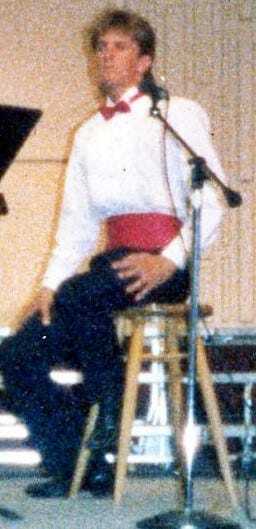 Not my shoes
Not my shoes
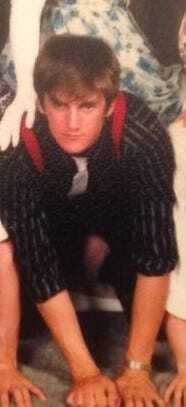 Pretty fly for a bench.
Pretty fly for a bench.The look followed me to college, and while many of my schoolmates swanned around in J. Crew, I stuck to the battered Levis, worn-thin Ts, and much-washed flannels. I had an occasional awareness that I looked less-than professional, not even appropriate for some of my extra-curricular activities, but I hadn’t caught on that clothing is as much costuming as covering.
 I ran Student Government Senate meetings like this, as the SGA vice president, which is maybe why I lost when I ran for president!
I ran Student Government Senate meetings like this, as the SGA vice president, which is maybe why I lost when I ran for president!I worked in a warehouse for nearly a year after college, which didn’t require a change in my style paradigm. It wasn’t until I got my first journalism job that the jeans lost their holes and patches, and the sketchy Ts became collared shirts and sweaters. I bought some neckties from a lawn sale the guys living below me were throwing to pave the way for their relocation to Key West.
I didn’t know I was supposed to match my leathers (shoes, belt, watch strap) until the first incarnation of Queer Eye for the Straight Guy came out in 2003, and I can trace the beginnings of my first “dress-better” era to that moment. I discovered Banana Republic and The Gap. I swapped out my backpack for a messenger bag because an article in GQ suggested that only children used backpacks, and I bought decent shoes in both brown and black.
 At the track, pretending to make a bet.
At the track, pretending to make a bet.Job led to job, and I continued to “try”. Nothing too expensive, but I did have a black suit and several ties, a pale-blue Oxford shirt, and a Timex watch with a reversible band.
In the early Aughts I switched professions and adopted what I called my “teaching costume”: necktie, button down, Carhart work pants, black or brown Doc Martens and belts to match. This stuff lasted for years, and I only bought new when I needed to replace something. I went to the same person every seven weeks for a haircut.
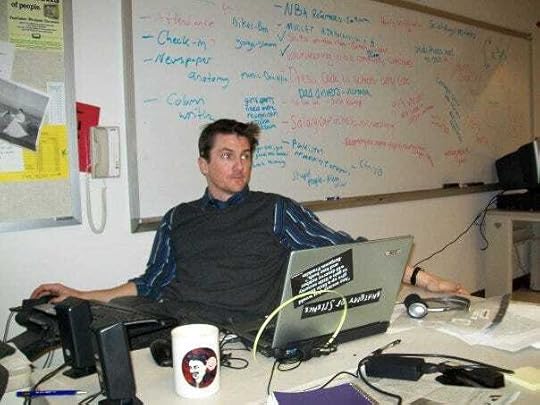 Sometimes, Teacher Rob even wore a sweater vest.
Sometimes, Teacher Rob even wore a sweater vest.As my teaching career began to wrap up a decade later, I decided I was going to start wearing kilts. I had some idea about provoking conversations about gender, and anyway Lazarus Long said kilts were a great way to hide weapons. I bought four and cycled them into my wardrobe. Eventually, my kilt ensembles were the most formal things I owned.
 So formal, they let me marry them. But not in a throuple, way.
So formal, they let me marry them. But not in a throuple, way.Then Trump got elected, and COVID hit. Aside from the kilts, my wardrobe was barely worthy of a writer who seldom left home. My driver’s license and passport both suggest “long-haired hermit” and in the self-portrait I took on my 51st birthday last October, I’m wearing my old high-school/college uniform: jeans, a t-shirt, boots, and flannel (although my belt does match my boots). I still teach, college now, but even for a ‘cool prof,’ my costume is lacking.
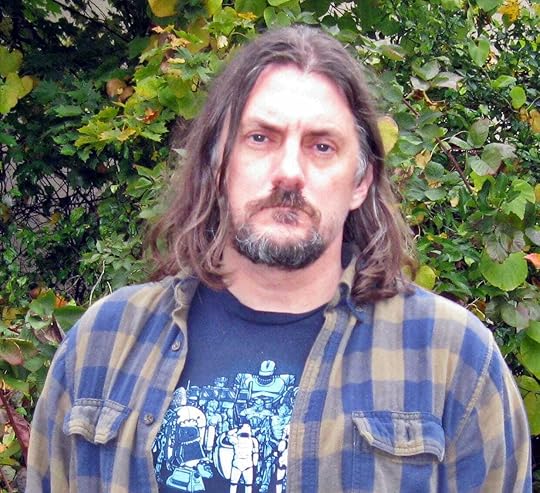 It’s in the syllabus.
It’s in the syllabus.I don’t believe that clothes make the “man,” but I do believe there’s power in the costume/uniform. Batman can only Batman when he’s wearing the cowl. I felt professional in my teacher togs, even on days I was not at 100 percent. It was my crutch. My forward face.
My current style offers no support. When I face forward in it, I feel small … both invisible and terribly exposed. I’m still that moody kid from Maine, which is both a good thing, and something I need to conceal (even from myself) at times. I need a Professional Writer Costume, if only to fool myself on the days I’m not feeling it.
So, I got a haircut and resolved to pay better attention to how I present myself to myself. I’m doing this for me, but the rest of the world can buy into it if it wants.
Note: The style gurus I’m watching the most are Harry Has (mostly because I like the way he says ‘outfit’) and Ashley Weston. Soon, I, too, shall be pretty.
NEWS: Pre-orders for Earth Retrograde — the sequel to last year’s Mercury Rising — are available where ever you buy books. C’mon. All the cool kids are doing it.
Thanks for reading twenty-first-century blues! Subscribe for free to receive new posts and support my work.
August 2, 2023
I Lost More Than 600 Pounds - and My Childhood - in a Week!
It started with a flooded basement and ends with a contemplation of David and the things we leave behind.
Rising water required the temporary relocation of many of our storage bins from the basement to the garage, recently, and among those bins was the one containing our DVDs. We’ve culled the things before, but there are easily a hundred still in there: seasons of Buffy the Vampire Slayer and Smallville, all the Star Wars movies, Serenity, The Station Agent, and Once, among many others.
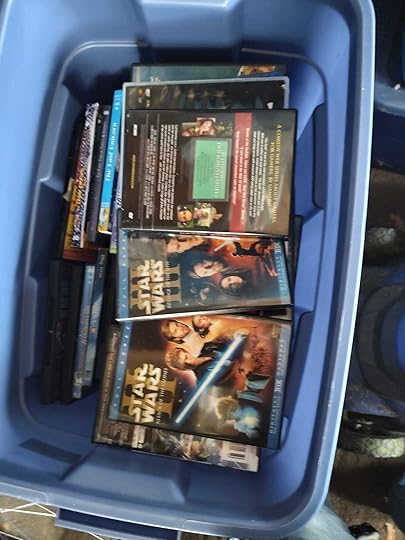 DVDspalooza!
DVDspalooza!The last time we used the DVD player was in January to watch Pink Floyd’s The Wall in preparation for a college class I was teaching. There are a couple of DVDs we watch yearly, Emmet the Otter’s Jug Band Christmas springs to mind, but most have lingered in the storage bin untroubled for several years. If I get the urge to watch Star Wars, it’s easier to boot up Disney+ than it is to dig through a basement bin, and I’m pretty sure I have a digital copy of Once on my Apple account.
One of the bins we moved contains the CDs. I still buy most of my music in that format, although I copy them to my iPod soon after purchase.
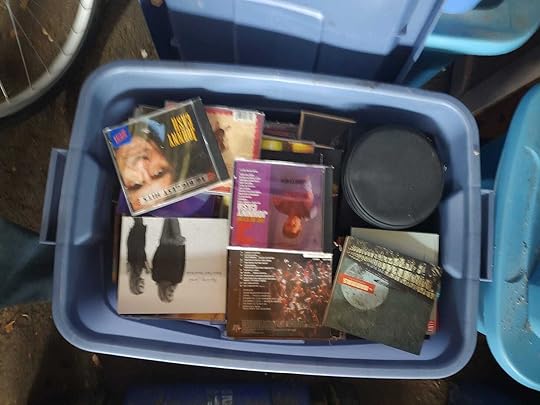 The hell with streaming music, amirite!?
The hell with streaming music, amirite!?Earlier this week, I took forty years of comic books to the local comics-shop and said, “Make me an offer.” Twenty-seven boxes, more than six-thousand single issues, more than 600 pounds of paper. They weren’t in flood range, but I hadn’t opened a single box since I re-organized them about five years ago. Sure, it’s possible that sometime in the next thirty years, should I last that long, I will want to read Wolverine #1 again, but I bet I’ll be able to find it electronically, in a format I won’t need to dig through a box, open a plastic sleeve, and use a magnifying glass to read.
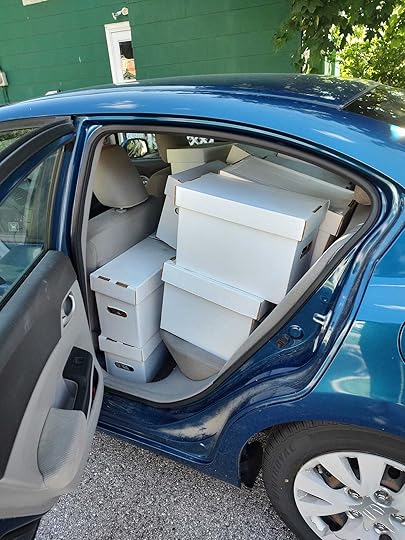 Despite this, I am well-adjusted and married well.
Despite this, I am well-adjusted and married well.I have a lot of books. Among them are copies of just about everything Robert B. Parker wrote. Maybe I’ll want to read them – even the turkeys -- again before I turn 80 (in twenty-eight short years), but in the meantime they are just taking up space. I justify them by saying someone else might want to read them – some orphan-from-the-storm-given-shelter with nothing better to do than read mystery novels – but that’s probably never going to happen. No one has ever asked to borrow one, either. If I want to read The Godwulf Manuscript again, or Night Passage, I suppose I could go to the library.
In all likelihood, I could get rid of all of it without missing it much. Dropping off the comic books was, frankly, a relief. I moved house more than thirteen times between 1994 and 2007, and those heavy boxes came with me. At one point, they had their own storage unit.
Among all the streaming services I pay for, I could let go of hundreds of pounds of physical and emotional weight tomorrow. I can borrow e-books from the library and change the print size, ensuring that I can read every word comfortably. It’s the future, baby! What if I just go with it?
But what if…?
Pink Floyd’s The Wall isn’t available on any legal streaming site at the moment. The only way I can show it to my students is via that DVD. Meanwhile, Disney+ is up to all kinds of bullshit, pulling things off their streaming service to save costs, much of it never committed to physical media. Can I rely on Amazon to store and pay the licensing fees on my favorite films until I die?
Maybe there won’t be any public libraries in thirty years. What happens if our vulnerable infrastructure fails, and we are left in the dark sans WiFi and cell signal? At least with my CDs and a solar charger I can spend the apocalypse listening to my tunes and sipping bourbon. (Assuming there is bourbon.) I can read the physical copies of my books and loan them out to other survivors. We can have CD-listening parties in the dark! I could entertain the kids with my comic-book collec—
Oh, yeah.
Storage bins full of media as metaphor. I don’t sleep well a lot of the time. I am a science-fiction writer, and I very much doubt Mars is a viable alternative to a climate-addled Earth. There are too many people to move, too much distance to cross, and far too many obstacles.
But say Elon Musk and a few thousand of his pals did make it. What would they bring? Me? No? Real books? Hardly. The Mona Lisa is small enough, surely, or Van Gogh’s Starry Night. But Michelangelo’s David is 17 feet tall and weighs 12,500 pounds, or about twenty-one times more than my comic-book collection. Sure, David can be scanned and 3-D printed at any scale you desire. The idea of David will survive, although the most amazing thing about that statue is that it was hewn from rock with hand tools. If Musk and Co. leave David behind, what else – who else – will be on the chopping block? What will be left behind? It’s a question I try to address in a lot of my fiction. Not everyone or everything will make it to the future. (Note: History suggests rich, white people will be okay.)
But when your basement floods and your garage fills up, sacrifices must be made.
Right?
NEWS: Copies of Earth Retrograde (due out October 24) are starting to appear in the hands of reviewers, and I am very much hoping the book is well received.
I was on a radio show the other day!
I’m headed to ArmadilloCon this weekend. Love to see you if you are there.
Thanks for reading twenty-first-century blues! Subscribe for free to receive new posts and support my work.



